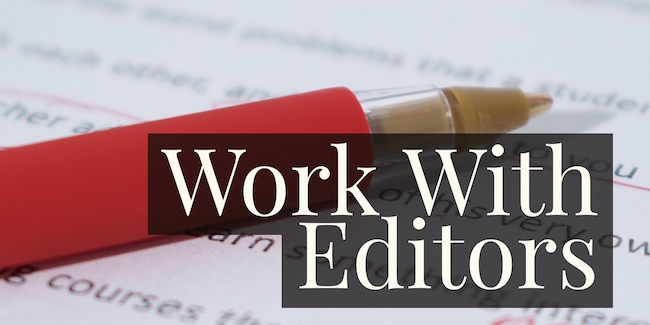I recently received an email from a concerned blog reader and aspiring freelance writer. He’d just gotten his first gig and was concerned about a recent experience he’d had working with an editor.
I’ve been writing for a long time and I’ve worked with all kinds of editors, so in this post I’m going to teach you how to deal when you work with editors as a part of your business.
Table of Contents
ToggleKnow the difference between a professional and a jerk.
Unfortunately, in the case of my blog reader, his first experience working with an editor was a terrible one. The so-called editor insulted the writer instead of providing professional feedback. While this isn’t the norm, it does happen every once in a while.
That’s why if your line of work requires you to work with editors, you need to discern between a good editor and a crappy one.
A good editor will try to help you become a better writer, designer, photographer, videographer, etc. A bad one will make you feel like you don’t know what you’re doing. More specifically, a bad one will use insults.
Assuming your editor is a good one, keep reading so you know how to deal with them.
Realize that edits aren’t personal.
Look, I get creatives can be temperamental about their work. Heck, I am a creative and even though I’ve been in the game a while, I still sometimes catch myself getting sensitive or annoyed. But, if you’re going to work with editors, you need to stop being in your feelings.
At the end of the day, editors are there to make you sound better. I know for a fact that my writing has improved drastically over the years thanks to my editors teaching me how to be a better writer.
Use it as a learning experience.
I did a blog audit not long ago and I was pretty shocked at what I used to publish. Fast forward a few years and I’m definitely more polished. This is because instead of taking edits personally, I’ve tried to view them as a learning experience.
Because here’s the reality: I didn’t go to journalism school. I didn’t study marketing. I sure as heck didn’t study finance (I actually hate math). Sure, I was an English major, but it was English Literature. I was writing argumentative papers about Shakespearean sonnets, not marketing or sales copy about financial topics.
While I don’t think a degree for writing (or most creative pursuits for that matter) is necessary, the reality is I didn’t have any formal training when I started my career. My formal training has come entirely from learning how to work with editors.
Know that some clients will make you jump through more editing hoops.
The editing process for my small business clients is totally different from the editing process with corporate clients. The former is usually write it and be done with it. The latter sometimes goes through several rounds.
The truth is it’s just a part of the game. Of course, a bank is going to require more edits! They have compliance to deal with and an army of attorneys on their payroll.
Editing doesn’t have to be scary, and if you realize that even the corporate clients are trying to help you become a better creative, it’s easier to deal with.















